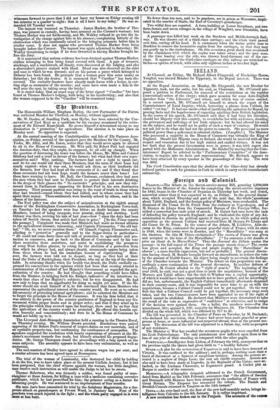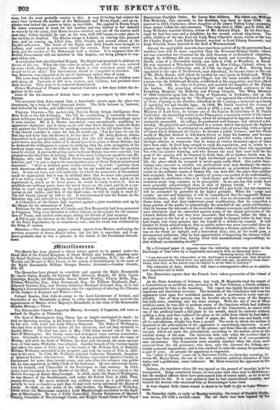gortigit an 4roIonial.
FRANCE.—The debate on the Secret-service-money Bill, granting 1,000,000 francs to the /ffims' ter of the Interior for completing the secret-service expenses for 1845, began in the Chamber of Deputies on Thursday last week, and closed, somewhat sooner than it was expected to do, on Friday. In the general discus-
sion, which occupied Thursday and part of the next day, the whole 'questions about Tahiti, England, and the foreign policy of Ministers, were overhauled. The
dismissal of the Count De St. PrieSt from the embassy at Copenhagen,and of M. Drouyn de Lhuys from the Commercial Bureau of the Foreign Office, fur- nished a somewhat less stale point of attack. M. Guizot had once more the task of defending his policy. towards England; and he vindicated the right of any Ad- ministration to dismiss its political agents if they gave to its whole policy such opposition as the present Cabinet had received from M. Drouyn Do Lhuyis and the Count De St. Priest. In the course of the debate, M. Liadieres, Aide-de- camp to the King, contrasted the present peaceful state of Franca with its state in 1840, when the towns were in disorder, and the " Marseillaise " was sung at the theatres. On this M. Thiers exclaimed—" The crown of France was given and accepted to the tune of the Marseillaise." [" La couronne a eti (Jennie et prise au chant de kt ifarseillaise." Thus the Journal des Debuts quotes the passage: in the full report of the Times the passage stands thus—" The crown was given and accepted, the King and people singing the Marseillaise ' as chorus"; a more forcible expression, but not so probable.] The general discus- sion having closed, M. Bondet brought forward an amendment, to reduce the vote by the amount of 25,000 francs; his object being simply to ascertain the feelings of the Chamber towards the Ministry. The debate on this proposition was ac- cordingly a mere continuation of the general discussion. In another defence of his policy, M. Guizot alluded to the "right of search." The beginning of the year 1844, he said, was not a good time to push the negotiations' because of the Morocco and Tahiti affairs; but the visit to Windsor was a capital opportunity, of which it would have been unpardonable not to have profited, and he accordingly did so; but, unfortunately, the English Cabinet immediately afterwards dispersed to their country-seats, and it was impossible for some time to go on with the negotiations, because a Cabinet Council could not be got together. On the very first day that a Cabinet Council could be got together, the necessary steps were taken, and the two Commissioners have been apjainted to see if the right of search cannot be abolished. He declared that Ministers were determined to take the result of the vote as expressive of " confidence " or otherwise, and to resign if the decision were against them. On a ballot, the numbers were—For the amendment, 205; against it, 229; majority for Ministers, 24. The Chamber then divided on the whole bill, which was affirmed by 217 to 41.
The bill was presented in the Chamber of Peers on Tuesday, by M. Duchatel; who declared Ins conviction, that France had never been more peaceful or pros- perous at home or more influential and respected abroad, than at the present mo- ment. The discussion of the bill was adjourned to a future day, with no prospect of any resistance. The Minister a War has recalled the seventeen pupils who were expelled from the Eeole Polytechnique. The only punishment now Inflicted upon them is the loss of one year of their standing as compared with the other pupils.
PoirruoaL.—Intelligence from Lisbon, of February the 18th, announces that on the previous night the Queen had given birth to "a -healthy Infanta." SPAIN.--A plot for the restoration of Espartero is said to have been detected at Vittoria. It was confined to the military; and is, perhaps, nothing more than a
burst of discontent or a figment of suspicious tyranny. Among the ar-
rested is a nephew of Diego Leon; the rest are chiefly sergeants. Are also said to have been made at Logrollo, in the Regiment of the Union; once at- tached, as the Luchana Chasseurs, to Espartero's guard. A Carlist plot at Burgos is another of the rumours.
Mostocco.—A telegraphic despatch addressed to the French Government, dated from Madrid on the 19th February, announces that "the affairs of Sweden and Denmark with Morocco have been arranged by the mediation of France with Great Britain. The Emperor has renounced the tribute. The Danish amt. Swedish Consuls returned to Tangiers on the 14th instant."
Ismoa.—An over-land mail, the first of the new half-monthly series, brings in- telligence from Calcutta to the 8th January. It is rather important A. new revolution has broken out in the Punjanb. The accounts of the catIMIP
vary, but the most probable version is this. A very ill feeling bed existed for some time between the mother of the Maharajah and Beers Singh; and an ex- plosion ass looked for, sooner or later, as inevitable. She applied to Beers Singh for some command of trust for her brother, and was backed in her demand so warmly by the army, that Beers became alarmed, and put off the matter until next day: Wore daylight he was on his way, with 800 troops, to some place in the vicinity of Jumbo°. The Khalsa troops in Lahore, on hearing this, pursued him: and en coming up, killed him, Jells Pundit, and several others of the
iiithr:z adherents. The heads of the Rajah and Jells Pundit were brought to and carried in procession round the streets. Next day salutes were fared, and the mother of the Maharajah held a durbar. It is supposed that the British Government will not interfere in this dispute; not being pledged to sup- port either side.
A revolution had also disturbed Nepaul. The Rajah had promised to abdicate in favour of his son. When the time came he refused.; on Which the son, assisted by some chiefs, deposed him. The new Rajah is only seventeen years old, and is said to be an idiot! The Government would be compelled to interfere. The war, ,oweever, was expected to be one of diplomacy rather than of arms. The news from Scinde is still unfavourable. 'the Highlanders at Sukkur were still dying off. Upwards of 200 men, women, and children, had perished since their arrival. They were to be removed immediately. Prince Waldemar of Prussia had reached Calcutta a few days before the de- parture of the mail. Some of the Ex-Ameers of Scinde have come as passengers by this mail to Europe. The accounts from Aden report that a formidable attack upon the place was threatened, by a body of forty thousand Arabs. The little fortress is, however, well defended by works, and sufficiently garrisoned.
UNITED STATES.—The packet-ship Patrick Henry brings intelligence from New York to the 8th February. The -bill for establishing a territorial Govern ment in Oregon had passed the House of Representatives. The proceedings upon it were curious. Mr. A. L. Brown introduced some amendments, modifying its aggressive character; and in doing so, he said that Great Britain could not make war against the United States for anything contained in the bill before them; but if she should consider it cause for war, he would say, "Let her have it—on the that day and hour that she desires it, let her have it." Mr. John Quincey Adams deprecated rash precipitation, and proposed that the bill should not take effect until twelve months after notice of it should have been given to Great Britain: but he declared his willingness to concur in notifying that the joint occupation of the territory must cease, since he believed that the time had come when the question must be settled. A proviso for giving notice to Great Britain was twice rejected; but adopted on the third time of moving. One of the most belligerent speakers was Mr. Douglas; who said that the United States wanted the Oregon to protect their fisheries, and "to put a stop to the unscrupulous aims of Great Britain atuniversal dominion." "Give us military posts in that territory," he cried; "garrison them with American officers and soldiers, and he for one would not care much about laws. It was not laws, nor civil authority, by which the possession of the country could be maintained; but it was by military force that we must take possession of it as well as keep it." "If the question should bring us to war, much as he deprecated it, much as he loved peace, he would be ready to meet it. Let us establish our military posts, have our naval forces on the coast, and be in a con- dition to repel any aggression on the part of Great Britain, and punish any in- vasion on our rights; and then if war shall come, we will be ready to meet it" The bill finally passed by 140 to 54. It was introduced into the Senate on the following day, and referred to a Special Committee.
A Committee of the Senate had reported against a joint resolution sent up by the House for the annexation of Texas.
Petitions for the annexation of Canada and New Brunswick had been presented to Congress. They were intended to reflect ridicule on the scheme for the annexa- tion of Texas, and excited some anger among the friends of that measure. A bill to pay the interest on the debt of Pennsylvania bad passed both Houses of the State Legislature, by an unanimous vote; and the event was celebrated by the firing of cannon.
hissuso.—The American papers contain reports from Mexico, confirming the previous accounts of Santa Anna's defeat, but -his fate is uncertain, and it ap- pears probable that he was a prisoner in the bands of the Provisional Govern- ment.



























 Previous page
Previous page